The Golden Dawn or Thoth Method
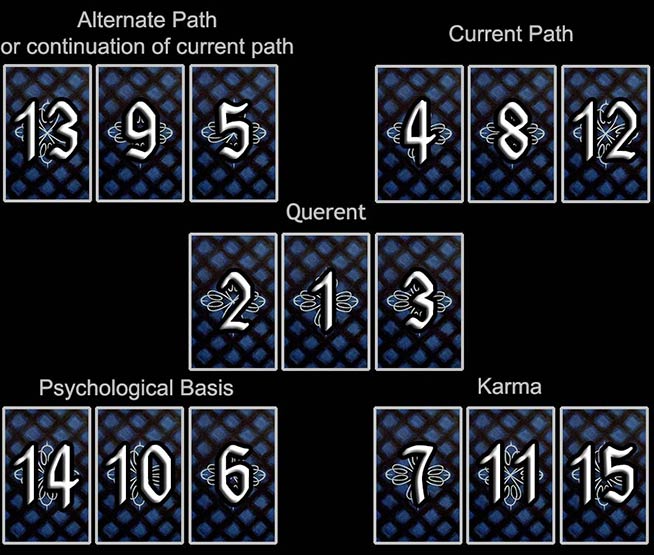
Difficulty: Complicated
Note: Tarot decks that use reversed cards such as the Rider-Waite do not work well with this spread, which was designed to be read using elemental dignity.
The Golden Dawn spread is best suited for use with the bifrost Tarot and especially the Book of Thoth, as these decks are meant to be read a certain way with the court cards. Princes and queens represent actual men and women connected with the matter, while princesses generally represent ideas; thoughts or opinions, and knights represent arrival or departure of a matter depending on the direction faced.
In this tarot spread, particular attention should be paid to a card's exact position in relation to its neighbours. Whether the neighbour cards bear the same energy (suit) determines whether a card is considered well-dignified or ill-dignified. Opposite suits ill-dignify each other, while other suits are considered friendly. Tarot cards of the same suit or element strengthen each other.
As with other tarot spreads, it is important to count the cards' tendencies, such as whether there is a lot of one particular suit or number pattern. The patterns reveal special messages. Having several majors present indicates higher forces at work, several cups suggest strong emotions, etc.
Card #1 represents the reader and the nature of the topic at hand.
Cards #2 & #3 are read in extension of #1 to further comprehend the nature of the topic.
The two sets of three tarot cards at the top of the spread represent chronological sets of events. The current path as it would unfold naturally is represented by cards #4, #8, & #12. The alternate path that could be taken is represented by cards #13, #9, & #5. However, if the reader gets the feeling these cards are telling them they go together, then the alternate path is to be considered an extension of the current path, and to be read chronologically in this order: #4, #8, #12, #13, #9, #5. Just keep in mind: this is only if the two paths seem particularly similar.
Cards #14, #10, & #6 shed light upon the psychological undertones of the current issue.
Cards #7, #11, & #15 represent the influences of karma and destiny beyond the reader's control. These cards suggest adapting to this, as fate.
Your Golden Dawn Reading
| The Alternate Path (or Extension of Current Path) |
Your Current Path |
|||||
5 of Swords |
3 of Wands |
7 of Coins |
6 of Swords |
The Lovers |
2 of Swords |
|
| The Querent | ||||||
3 of Cups |
9 of Swords |
The Sun |
||||
| The Psychological Basis | Karma | |||||
Temperance |
Prince of Swords |
3 of Coins |
King of Wands |
10 of Coins |
4 of Swords |
|
The Querent
cards represent the querent and the nature of the topic at hand. The first card (in the center of the spread) represents the very core of the matter, and the other two cards around it are added to it in order to further comprehend the nature of the topic.
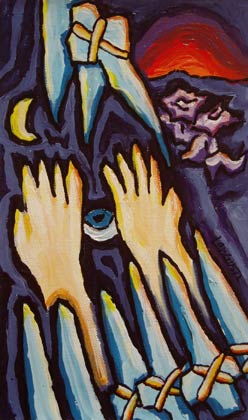
The swords look like teeth, which at any moment could bite. The hands are held up for protection. The eye wants to open, but its vision is obstructed.
The waning moon emphasises the existing fear. The sunrise is at hand. Roses promise development, joy of life and the coming forth of emotions in the near future.
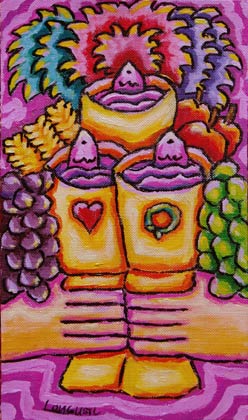
All the equipment for a celebration is united, wine, food, fireworks, love, happiness and society. There is nothing missing. The snake, which is biting its tail, suggests that celebrations begin and end. We let them come and go, like fireworks; they do not last very long.

The sun can be seen clearly and it dominates the picture. The last walls are being conquered and in between them flowers are already growing. This lets us suspect that the difficult path is at an end. The path, which continues, can already be seen beyond the wall.
Your Current Path
cards represent your current path as it would unfold naturally. These cards are read in chronological order from left to right.
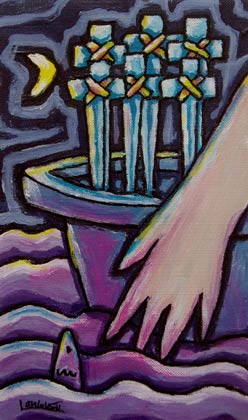
The hand is fairly big, which makes the boot seem small and unsteady. It is consciously trying to keep in contact with the water and the creatures living in it.
Six swords are on board and are supposed to be giving protection. The scene is dark and a little sinister. The colours portray a mixture of emotionality and consciousness. The moon is waxing. The path through uncertainties and fears can take time.

The picture shows the connection with the opposite theme represented by two circles (blue = conscious) which combine to form an oval. The oval represents striving for unity on a higher level. The two hands stand for polarity and the confrontation with the tree of eternity and the tree of knowledge (of good and evil) with heart-shaped fruit. The serpent is coiled up at the foot of the tree of knowledge.
The yellow background emphasises the energy of the moment. Fish and water show the duality again and the produced flow of energy. The archangel Raphael watches over everyone with his blessing, indicated by God's eye.
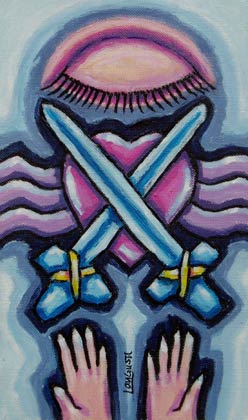
The picture shows a closed eye. A lot is still taking place inwardly. The heart and water in a way are being crossed out. Emotions have to be left out for the moment.
The varying thoughts seem to influence one another. Both hands are open. Each thought is equally valuable at the moment.
The Alternate Path
cards represent the alternate path that you could choose to take in lieu of the Current Path. However, if the cards that come up seem to indicate that they go along with the Current Path, these three cards should be interpretted not as an Alternate Path, but as a chronological extension of the Current Path (also read from left to right).
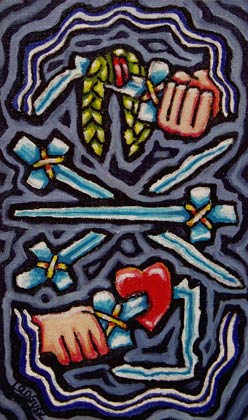
The middle sword divides the scene. It symbolises disconnection in itself and is the only one that has remained whole.
The 'winner's' sword, decorated with a laurel wreath, seems to be less bent than that of the 'loser', but it is also unusable. The pierced heart shows the 'loser's' certainty of having injured his enemy in the worst possible way.
The dark colours in the picture show that it is a matter of something unpleasant. The energetic connection, portrayed by the waves at the top and bottom, has been cut off.
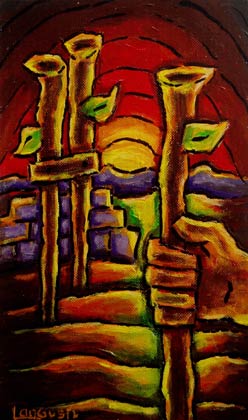
In front of the rising sun the first posts are being erected for the building of a new house. The hand has taken a firm hold of the wand; part of the wall has already been erected.
The wall symbolises the appearance of our conceptions. The mountains in the background show the definite ideas and conceptions that will materialise in the future.
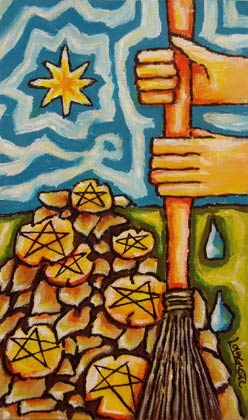
Seven pentacles are lying on a heap of leaves which is being swept up. They look like unusable fruit. Two tears show that the sweeper is grieving over his lost harvest. The star in the background suggests that the loss is small in comparison with the high goal which is being aimed at.
The Psychological Basis
cards shed light upon the psychological undertones of the current problem.

The path through the underworld can be seen which eventually leads into light. The path is edged with lilies, the underworld flowers. The abstract archangel Michael is helping to find the right composition for the flow of energy, in other words is on the way through the subconscious (forgotten) to keep a minimal contact going with the conscious e.g., by transmission (documents...)

The strong helmet protects the prince, while, with eyes closed and head bent forward, he is demolishing the hard wall. Some bricks are falling down. A part of the wall looks like a bookcase.
This is all about ancient knowledge and opinions, the details of which are being asked about or, in the truest sense of the word, which are being blown into mid-air. However, with his eyes closed the prince cannot take into consideration what he is throwing around.
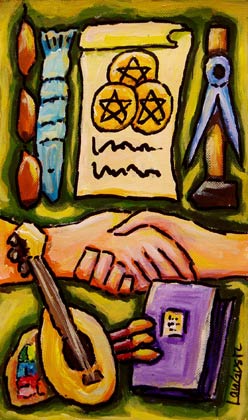
The picture shows an attestation as a symbol of real development and change, framed by symbols of different areas of life: a fish, sausages, a hammer and compass for handicrafts, a lute, a palette and brushes for art, a book for knowledge, appreciation and education, the two hands for social understanding.
Karma
These cards represent the influences of karma and destiny that are beyond your control. They suggest adapting to this fate.
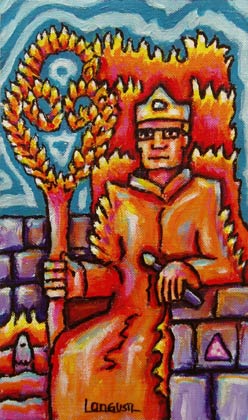
The wall confines the fire and bundles it up. Its violet colour shows that it has been built consciously and with spiritual energy, intent on higher ideals.
The triangle on the square shows the ideal integration of divinity and mortality. The fish in the fiery water indicates fiery emotionality as the basis for materialism. The symbol of the wand is recognised by the nine-fold loop on the back of the card.
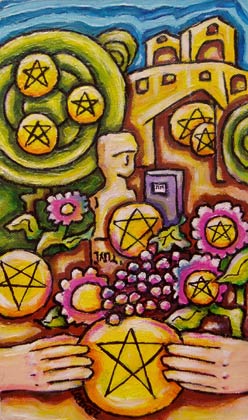
The pentacles can be found inside and outside the town, as fruits on trees, as an exchange object, as a value which can bring us beauty, knowledge, nutrition or culture, by us exchanging these values, if necessary, with the help of payment (money).
The wise man knows that only by exchanging our goods amongst ourselves can we make a rich community. One pentacle shows an upside-down pentagram.
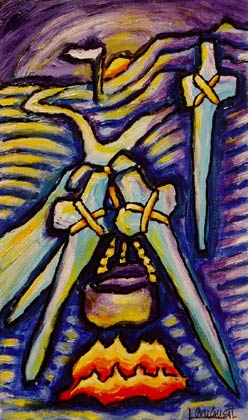
Three swords are holding a violet cauldron, under which a fire is burning. Something is being "extracted". The violet colour indicates a spiritual process. The sun is setting; nothing more will happen today. To sleep on it will help.
Tomorrow it might be possible to grasp the fourth sword and to take the right path in further conflicts. The path past the white flag is also possible.
